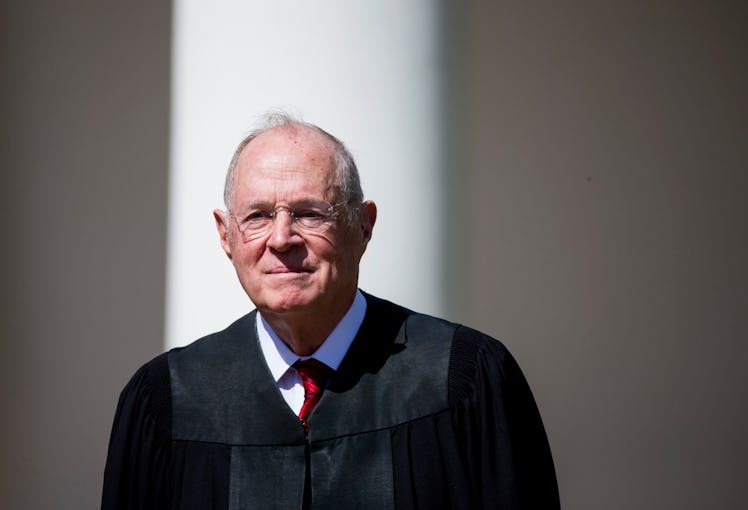
Kennedy's Retirement Is A Big Deal For The Future of LGBTQ Rights
On Wednesday, June 27, longtime U.S. Supreme Court Justice Anthony Kennedy made the shocking announcement that he'd be retiring, leaving President Donald Trump to nominate a new judge to take his place. The announcement has been cause for alarm among many progressive circles in the capital and beyond, given the wide range of opinions and issues the justice has weighed in on over the years, with profound effects. Here's how Kennedy's retirement could affect LGBTQ rights for decades to come.
Kennedy was seen as a solid swing voter in the SCOTUS and delivered numerous tie-breaker decisions in some of the biggest cases in the last two decades; among them, some of the most important decisions with bearing on the rights of LGBTQ individuals in the country.
"If we lose this seat," notes civil rights advocate John Aravosis in a tweet, "LGBT rights could also be gone."
In the last month alone, Kennedy swayed the vote on the Masterpiece Cakeshop v. Colorado Civil Rights Commission, siding with the baker who denied to make a wedding cake for a gay couple. But in his decision, which was grounded in a finding that the baker's religious beliefs weren't fairly treated by the commission, he reaffirmed the rights of LGBTQ people to be protected against discrimination.
In his tenure on the court, the Human Rights Campaign (HRC) notes, Kennedy issued decisions on several major cases affecting LGBTQ rights. Those include Romer v. Evans, which reiterated LGBTQ protection against discrimination; Lawrence v. Texas, which deemed unconstitutional laws that prohibited intimate relationships between two people of the same gender; and US v. Windsor, better known as the Defense of Marriage Act (DOMA) decision, which found that a law prohibiting same-sex marriage was unconstitutional.
But perhaps the opinion for which he is most known is Obergefell v. Hodges, which upheld that same-sex marriage must be recognized regardless of where a couple was married. In his opinion for the court, issued June 2015, he wrote:
No union is more profound than marriage, for it embodies the highest ideals of love, fidelity, devotion, sacrifice, and family. In forming a marital union, two people become something greater than once they were. As some of the petitioners in these cases demonstrate, marriage embodies a love that may endure even past death. It would misunderstand these men and women to say they disrespect the idea of marriage. Their plea is that they do respect it, respect it so deeply that they seek to find its fulfillment for themselves. Their hope is not to be condemned to live in loneliness, excluded from one of civilization's oldest institutions. They ask for equal dignity in the eyes of the law. The Constitution grants them that right.
Needless to say, Kennedy's voice — and his vote — is seen as a huge loss for the LGBTQ community, which now faces the prospect of a solidly conservative, likely anti-LGBTQ appointee.
"Justice Kennedy's retirement should serve as a wakeup call for every pro-equality voter in America, said HRC President Chad Griffin per a statement on its website. "Trump wants a Supreme Court nominee who will undermine progress we've made on affordable health care, LGBTQ equality, Roe and more."
Trump has circulated a shortlist of candidates for appointment, and once making an official nomination, a nominee will need to be approved by the Senate. The Senate, which is currently in a Republican-held majority by a hair, is expected to confirm Trump's choice. Unless, that is, enough Republican senators defect from the party and vote him down.
Senate Majority Leader Mitch McConnell has already promised to move quickly on a confirmation hearing, and Democrats in the Senate are understandably ready to fight back. Under President Barack Obama, the nomination of liberal Judge Merrick Garland to the SCOTUS was blocked by Senate Republicans following the death of former Justice Antonin Scalia.
Now, the pressure is on to see whether Trump can push his nominee through the Senate confirmation process before the November elections, during which eight Republican-held seats will be up for election.
"The 2018 midterm elections just became the most consequential elections of our lifetime," added Griffin. "We must keep organizing, mobilizing, and holding lawmakers to account every single day — and then we need turn out like never before this November."